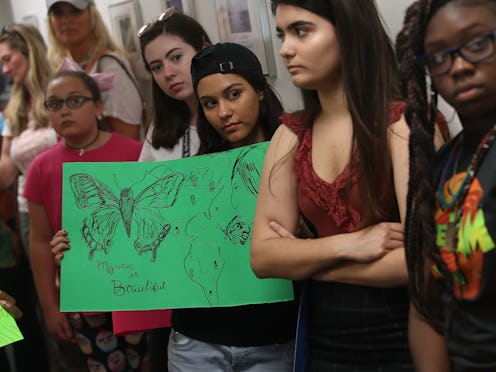News
How Arizona Just Made It Harder For Thousands Of Kids To Go To College

Since Donald Trump took office, recipients of the Deferred Action for Childhood Arrivals (DACA) program have been at risk of potentially losing their jobs and possibly being deported after years of living in the United States. Now, with a recent decision from the Arizona Supreme Court, it could make it harder for Dreamers to go to college, as thousands of DACA students' Arizona in-state tuition is being taken away.
All public Arizona colleges are banned from providing in-state tuition to DACA recipients moving forward, according to The Arizona Republic. This decision affects more than 2,000 students currently enrolled at community colleges or state universities in Arizona, and any potential applicants. The Arizona Supreme Court's latest decision comes after a new ruling made by the Arizona Court of Appeals, mandating Maricopa Community Colleges deny DACA recipients in-state tuition under state and federal law.
Dreamers could have to pay a lot more — roughly triple the cost, the same as out-of-state tuition — to attend these institutions. According to The Arizona Republic, DACA students that were paying around $9,834 in-state will now have to pay non-resident rates of about $27,618. At the Maricopa Community Colleges, in-state students pay $86 per credit, whereas out-of-state students pay $241.
Last year, Trump announced he was ending the DACA program entirely and set a deadline for March 5 for Congress to pass a law granting permanent benefits to Dreamers. But no legislation was passed, despite several proposals. In the meantime, DACA recipients' rights remain protected due to a court injunction that suspended Trump's ruling, meaning they're safe from deportation — for now.
However, DACA recipients might only have to pay 150 percent of in-state tuition, a lower rate approved by the Arizona Board of Regents in 2015 for non-residents who attended Arizona high schools. That would mean they'd pay approximately $14,751 next school year. More specific information on the ruling will be released by May 14, according to the order.
DACA recipient Korina Iribe, who is the director of advocacy at Undocumented Students for Education Equity, said she feels this new ruling will mean fewer students in Arizona’s universities and community colleges overall. “Unfortunately, today, a decision was made to block access to education for deserving Arizona students,” she told The Arizona Republic.
Trump has been a vocal opponent of DACA since he took over the White House last year. He blames the Democrats for not being able to strike a deal concerning the future of Dreamers. "DACA is dead because the Democrats didn’t care or act," the president tweeted earlier this month, "and now everyone wants to get onto the DACA bandwagon... No longer works."
However, while he blames Democrats, the White House rejected a deal earlier this year that would grant a fix for DACA in exchange for border wall funding. The same day he declared "DACA is dead," he repeated, "NO MORE DACA DEAL!" after saying Republicans needed to go "Nuclear Option to pass tough laws NOW" concerning border security.
Considering Dreamers aren't allowed to access federal and state financial aid, affording college was already a feat for many of them. Now, it's "going to be almost impossible," Karina Ruiz, the president of the Arizona Dream Act Coalition, told The Arizona Republic. Referring to the new ruling as a "state of crisis," she said the Arizona Dream Act Coalition will start raising money immediately to fund scholarships for the upcoming semester.
Meanwhile, many Arizona Republicans are in favor of the recent court ruling. Former Gov. Jan Brewer tweeted, "Today a victory for the rule of law when the Arizona Supreme Court ruled that illegal immigrants under the DACA program DO NOT qualify for in-state tuition, which is a taxpayer funded public benefit."
Ruiz went on to talk about how the state of Arizona will suffer because of this decision. "We are an asset. We contribute," she said of Dreamers. "For this state to not give us a chance to continue to do so, it’s wrong."